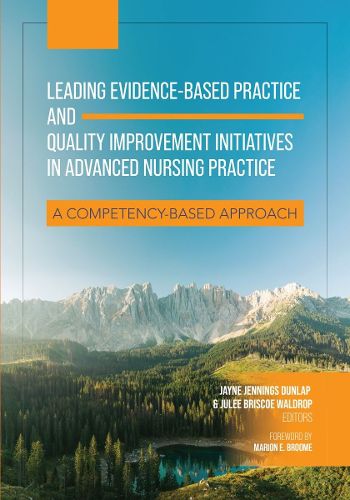Readings Newsletter
Become a Readings Member to make your shopping experience even easier.
Sign in or sign up for free!
You’re not far away from qualifying for FREE standard shipping within Australia
You’ve qualified for FREE standard shipping within Australia
The cart is loading…






Building on the success of the award-winning Introduction to Evidence-Based Practice and Quality Improvement for Professional Nursing Practice: A Competency-Based Approach, this textbook invites current and aspiring nurse leaders to elevate their understanding of evidence-based practice and quality improvement (EBPQI). Adopting a competency-based approach, the text aligns with the American Association of Colleges of Nursing's The Essentials: Core Competencies of Nursing Education.
Leading Evidence-Based Practice and Quality Improvement Initiatives in Advanced Nursing Practice is designed for graduate and doctoral level courses that prepare nurses for advanced practice nursing roles, including certified nurse midwifes, clinical nurse specialists, nurse practitioners, certified registered nurse anesthetists, and all advanced nursing roles and specialties. This text can also be highly effective as a guide for current nurse leaders engaged in expeditions to improve healthcare delivery and patient outcomes. amp lt br amp gt amp lt br amp gt Featuring contributions from distinguished experts across the field, the book offers a comprehensive, step-by-step guide to mastering the interconnected processes of research, evidence-based practice (EBP), and quality improvement (QI). It underscores the indispensable role of these combined elements in driving continuous healthcare advancements. With a strong focus on developing advanced nursing practice competencies, the text equips nurses to lead transformative, system-level initiatives in healthcare.
Chapters cover critical aspects of EBPQI leadership from identification of the problem to critical appraisal of the research and other types of evidence to support practice change, implementation, evaluation, sustainability, and dissemination stretching beyond the nursing discipline. Progressive exemplars are included in each chapter. Completed critical appraisal tools demonstrate real-world applicability. This book can serve as a compass for those who are committed to positively impacting health and healthcare to reach the summit as current and future nurse leaders.
$9.00 standard shipping within Australia
FREE standard shipping within Australia for orders over $100.00
Express & International shipping calculated at checkout
Building on the success of the award-winning Introduction to Evidence-Based Practice and Quality Improvement for Professional Nursing Practice: A Competency-Based Approach, this textbook invites current and aspiring nurse leaders to elevate their understanding of evidence-based practice and quality improvement (EBPQI). Adopting a competency-based approach, the text aligns with the American Association of Colleges of Nursing's The Essentials: Core Competencies of Nursing Education.
Leading Evidence-Based Practice and Quality Improvement Initiatives in Advanced Nursing Practice is designed for graduate and doctoral level courses that prepare nurses for advanced practice nursing roles, including certified nurse midwifes, clinical nurse specialists, nurse practitioners, certified registered nurse anesthetists, and all advanced nursing roles and specialties. This text can also be highly effective as a guide for current nurse leaders engaged in expeditions to improve healthcare delivery and patient outcomes. amp lt br amp gt amp lt br amp gt Featuring contributions from distinguished experts across the field, the book offers a comprehensive, step-by-step guide to mastering the interconnected processes of research, evidence-based practice (EBP), and quality improvement (QI). It underscores the indispensable role of these combined elements in driving continuous healthcare advancements. With a strong focus on developing advanced nursing practice competencies, the text equips nurses to lead transformative, system-level initiatives in healthcare.
Chapters cover critical aspects of EBPQI leadership from identification of the problem to critical appraisal of the research and other types of evidence to support practice change, implementation, evaluation, sustainability, and dissemination stretching beyond the nursing discipline. Progressive exemplars are included in each chapter. Completed critical appraisal tools demonstrate real-world applicability. This book can serve as a compass for those who are committed to positively impacting health and healthcare to reach the summit as current and future nurse leaders.